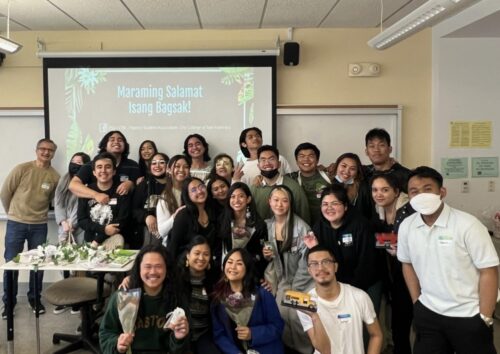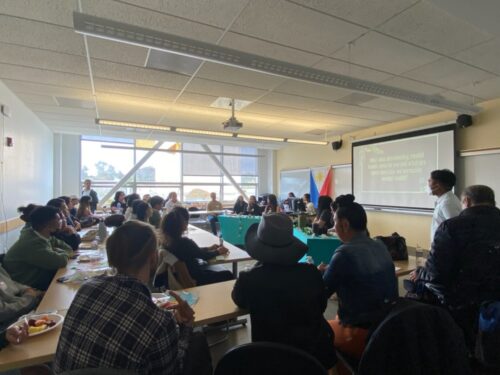Breaking the Silence: Addressing Mental Health Barriers in Filipino/a/x and BIPOC Communities
By Shawn Ree Canin
Mental health is a topic that affects all of us, yet it remains shrouded in stigma. In a world that highly values productivity, achievement, and success, meeting expectations often comes at the expense of our well-being. We push ourselves to the brink, ignoring the warning signs of burnout and fatigue until our mental health inevitably suffers. Mental health is an issue that affects people of all backgrounds, but it can be especially challenging for Filipino/a/x, Black, Indigenous, and people of color (BIPOC) communities due to systemic discrimination, racism, and cultural barriers. City College serves a diverse student population and should be responsible for providing resources and support to students from all backgrounds. This includes mental health resources that are culturally sensitive and appropriate for the needs of all students.
The Filipino Student Association organized the Mental Health Awareness Month Panel on May 8 at the Student Health Center, with the Philippine Studies department as one of the sponsors. The event highlighted the importance of mental health and the need for resources specifically designed to address the unique challenges facing Filipino/a/x and BIPOC communities. As President of the Filipino Student Association, I helped organize the event.

We invited four professionals to speak about the importance of mental health amongst the Filipino, Black, Indigenous, and people of color (BIPOC) communities. The main challenges include language barriers, cultural differences, and stigma around seeking mental health support within their families and communities. In the Filipino/a/x community, in particular, Filipinos’ colonial mentality, cultural values, and Catholicism play a massive impact on our mental health.
Colonial mentality
The Philippines has a long history of being a victim of colonization; Spain colonized the Philippines for 333 years (1565-1898), Japan for four years (1942-1945), and the United States for 48 years (1898-1946). The Philippines only gained independence from the US in 1946. Remnants of colonization are still embedded in Philippine culture, with colorism being one of the main manifestations of such. Filipinos often associate having lighter skin with being more attractive and deemed desirable. Having a darker skin tone is regarded as shameful. Eurocentric views continue to faze Filipinos’ self-concept and self-esteem.
Cultural Values
Speaking of shame, in Filipino culture, we call it hiya. When someone has a mental health struggle, hiya prevents Filipinos/a/x from getting the help they need. Community Mental Health Expert Stephanie Balón, who spoke at the event, shed light on how hiya exists to control Filipinos. Former Journalist and Associate Marriage and Family Therapist Christi Morales-Kumasawa spoke about her battles, about how she was called nakakahiya or shameful for having mental-health-related struggles.
Another part of our culture that affects our mental health is utang na loob or indebtedness. In most Filipino families, children are expected to ‘pay back’ their parents by supporting them financially or taking care of them when they get older. Additionally, pakikisama, which means “getting along with others,” has a good effect on interpersonal relations but often means we have to endure a relationship at the expense of our own well-being.
Religion
92.5% of Filipinos in the Philippines are Christians, and nearly 80% are Catholic, according to the Philippine Statistic Authority. In the whole Filipino diaspora, about 65% of them identify as Catholics, according to Pew Research. The “lack of faith” is believed to be why some struggle mentally. Filipinos within the community are pressured to keep a close relationship with a higher deity, and up to this modern age, the pressure of sticking to religious beliefs continually affects our mental health.
These barriers are not unique to Filipinos, Pew Research showed that Latin America is home to more than 425 million Catholics. Similarly to Filipinos, these communities have a long colonial history with unique challenges embedded in their cultural values.
Migration Policy Institute reports that 22% of the US population does not speak English at home, making language a barrier for students to seek the help they need. It can also contribute to feelings of isolation and disconnection from campus resources and support.
Mental Health at City College
It is especially important to prioritize mental health at City College and in our broader communities, especially with finals week coming up. Students in community colleges in the US are working and studying on top of other responsibilities. This balancing of priorities profoundly impacts our mental health and exacerbates existing disparities and inequities. Roughly 80% of community college students work, and 39% work full-time, according to ThinkImpact. As a result, many students experience increased stress, anxiety, and depression, particularly for students from marginalized communities.

Xiaowen Huang, an art student, shared how she has yet to seek help. “I would love for someone to find someone to help me out, but I don’t have the time either because I have to do my homework, and then I have work.”
Kera Roland, a video production and editing student, shared how she personally struggles with her mental health. “It affects the way I live my everyday life—like at school, my work, and my home.”
City College offers various mental health services, including individual and group counseling, crisis intervention, and referrals. While these resources are essential, it is imperative to annex more mental health programs that are accessible and culturally responsive on campus. This requires ongoing evaluation and feedback from students and professionals to ensure that resources are culturally sensitive, accessible, and effective.
The Mental Health Awareness Month Panel is a crucial event highlighting the importance of mental health awareness and support for the Filipino and BIPOC communities at City College. Resources specifically designed to address these unique challenges for people with various backgrounds can help break down barriers and ensure that students receive the support they need. City College must continue prioritizing mental health to ensure that students receive care to improve their overall well-being and academic success.
